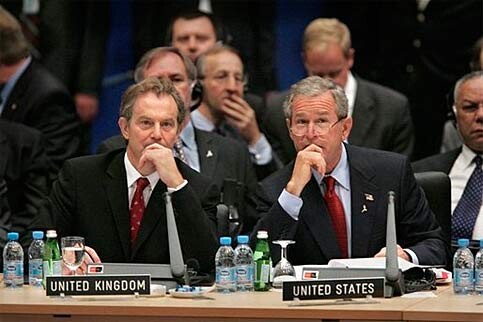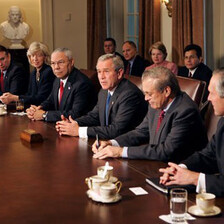The Electronic Intifada 30 June 2004

President George W. Bush and Prime Minister Tony Blair of Great Britain participate in the Working Session of the NATO-Ukraine Commission on the final day of meetings in Istanbul, Turkey, Tuesday, June 29, 2004. (White House)
Just when we thought the Bush Administration had reached the bottom of the ditch in its unprincipled behaviour, it surprises us by digging deeper. US Vice President Dick Cheney’s use of the F-word to a senior Democratic Senator and political opponent during a ceremony in the United States Senate on June 22 demonstrated that the Bush administration no longer feels a need to cover up its thuggish behaviour with even the pretense of decorum that gives democratic government its authority. Rather than apologize, Cheney said he “felt better after I had done it.” Was this an example of the kind of democratic discourse that the United States wants to teach the rest of the world?
A few days later, Cheney’s boss, President Bush, gave an interview to Irish television on the eve of his visit to Ireland for the US-European Union summit. What was notable was his impatience whenever interviewer Carole Coleman asked him any question that challenged his simplistic conception of the world and his role in it. Several times he admonished her not to interrupt him, displaying testiness that would be ruled out of order in a high school debate.
Coleman put it to Bush that a majority of the Irish people did not welcome his visit because “they are angry about Iraq, they are angry about Abu Ghraib.” Bush explained that “they must not understand.” When Coleman asked Bush why he thought so many people around the world do not understand what he is about, he answered simply, “I don’t know.”
Bush justified the Iraq war by claiming again that he invaded the country because Saddam refused to disarm Iraq’s “weapons of mass destruction,” without explaining how anyone can disarm themselves of weapons that do not exist. Underlining his imperviousness to reality, Bush stated that, “most of Europe supported the decision in Iraq,” and he claimed that only France opposed it.
On the Abu Ghraib prison torture, Bush reasserted the theory that the torture was the work of an isolated few, even though every day brings new evidence of abuse known and authorized at high levels, including from his White House. Several major international human rights organizations have concluded that Bush’s “war on terror” has been accompanied by systematic and growing human rights abuses. But these organizations too must not understand according to Bush’s logic.
Bush’s visit to Ireland, followed by a trip to Istanbul for the NATO summit, came on the heels of another diplomatic failure. The United States was soundly defeated in its effort to push through the UN Security Council an extension of the special immunity from war crimes trials enjoyed by its soldiers involved in UN peace-keeping missions. Any administration in touch with reality would have recognized at the outset that in the wake of Abu Ghraib such immunity, extraordinary and unjustified to begin with, had simply become untenable. Yet in Bush’s alternative reality in which the world — as he told Coleman — is safer on his watch, and the United States is guided by a pure and innocent heart, these kinds of demands are perfectly normal.
Coleman, who persisted in the kind of tough questioning with which few American reporters ever dare confront their government, asked whether the US approach to the Palestine-Israeli conflict needed to be more “even-handed.” Bush boasted “I’m the first American president to have called for the establishment of a Palestinian state,” adding, “that sounds like a reasonable balanced approach.” Of course he ignored the total backing he gave to Ariel Sharon’s policy to annex much of the occupied West Bank and to cancel the inalienable rights of refugees to return to the homes and lands from which they were ethnically cleansed.
It is encouraging that the broader US public, after years of complacency and unjustified trust in its government, has started to wake up to the seriousness of the catastrophe that the US administration has wrought. A recent Gallup poll found that 54 percent of Americans now think the Iraq war was a “mistake.” The same survey found that only 37 percent of Americans think the war made their country safer, while 55 percent said it had not. Bush clearly has no hope of convincing Europeans and Arabs to back him with his own domestic support draining away.
With this growing catalogue of disasters, Americans can be forgiven for thinking that anything is better than the Bush administration. From the Arab world, however, an administration led by Democratic challenger John Kerry looks like it would be nothing more than a cosmetic change in tone and style, while the growing harm that US policies are causing would continue unchecked. This week, Senator Kerry sent Florida Congressman Robert Wexler to Israel on his behalf. Wexler, a member of the House International Relations Committee and a close ally of the pro-Israel lobby, has been asked by Kerry to formulate the Middle East policy for the Democratic Party platform. During his visit, Wexler is due to meet with Israeli officials, including prime minister Sharon, Benjamin Netanyahu and Shimon Peres, and, bizarrely, the Turkish Ambassador to Israel, but with not a single Palestinian. A June 25 press release from Kerry’s envoy expresses “unequivocal support” for Sharon’s policies and adds, “Although Prime Minister Sharon has been reasonably successful in combating terror over the past several months, Israel still faces grave internal and external threats from a nuclear Iran and expanded terrorist networks in West Bank, Gaza, Iraq and around the globe who are being funded by Saudi and Arab sources.”
This kind of Israeli-inspired language, suffused with hostility to the Arab world and deliberately obfuscating issues, can make no contribution whatsoever to repairing the damage to US credibility and prestige let alone to bringing peace to the region. Such approaches, although ostensibly “pro-Israel” actually condemn Israel to an unending conflict which it will never win. True friends of Israel, if there are any in the United States government, would hold the country accountable and press it forcefully to end its cruel and oppressive regime over millions of Palestinians.
The United States urgently needs to make a radical change in direction to halt the wholly unnecessary slide into civilizational conflict that its policies since the 9/11 attacks are fuelling. If the US allowed itself to be guided by justice and fairness instead of an unquenchable thirst for power and resources, and unconditional support for Israeli extremism, Americans would be amazed by how quickly distrust and hostility would be replaced with respect and affection across the Arab world, isolating the fanatic voices that the US is now permitting to set the agenda. But the road to such a change seems depressingly long as was underscored by another event last week: the US House of Representatives voted by 407-9 to give full-backing to the Sharon-Bush-Kerry approach to Palestine. Let us hope that the voices of ordinary Americans can be heard above this discouraging din.
Ambassador Hasan Abu Nimah is the former permanent representative of Jordan at the United Nations. Ali Abunimah is co-founder of Electronic Iraq and The Electronic Intifada.





